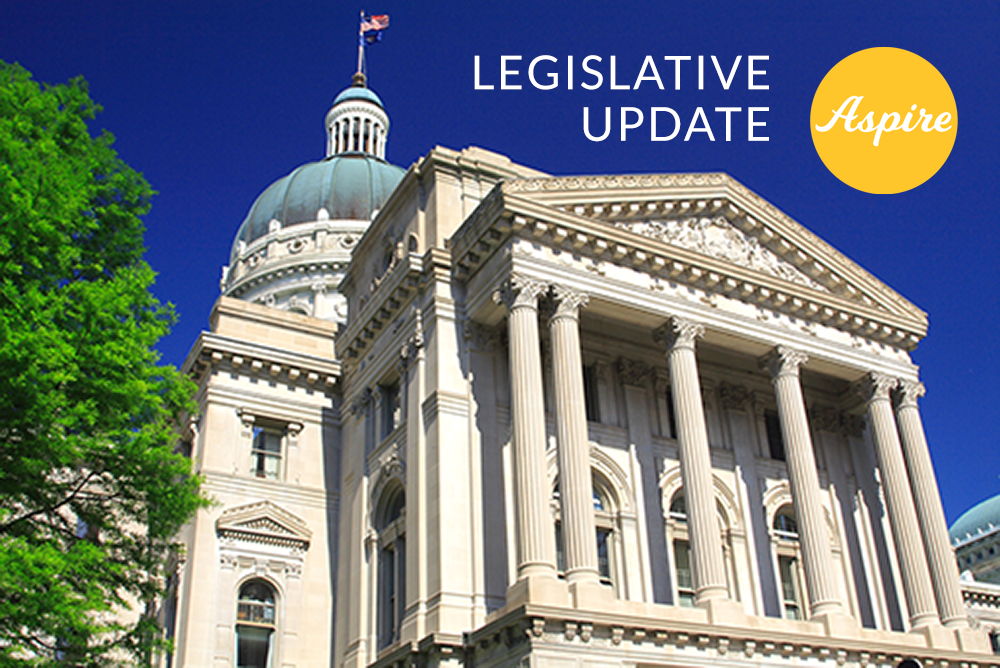Second Half Committee Deadline Leaves a Lot on the Table

The 2023 statehouse session is nearing the end. The Governor has already signed 14 bills into law. The deadlines for bills to pass out of committees are today (Tuesday) in the House and this Thursday in the Senate. Most committees already held their final meeting last week. Language can still be amended into bills on floor readings or in conference committee (more on conference committees next week).
Here’s where things stand on some key issues Aspire has been tracking.
We have been aggressively supporting bills that help expand affordability and access to early childhood education and childcare.
We last reported the language to make the On My Way Pre-K program permanent (currently a pilot program) was moved into HB 1591 and passed out of the Senate Education Committee, then reassigned to the Senate Appropriations Committee. Sadly, it did not receive an Appropriations hearing. The language to increase the income eligibility level was inserted into the House budget draft. However, all is not lost. The language from 1591 is eligible to be amended into another moving bill and the budgeting process is still in motion. We also remain optimistic other proposals from earlier this session will find their way into moving bills. Aspire will continue to speak with legislators and support language to help employees and employers with expanding childcare access and affordability.
Housing is another key factor in growing a workforce – especially workforce housing for our educators, medical workers, and advanced manufacturing workers. The cost of housing is driven by many inputs. The State can’t control the price of lumber (nor should it fix product pricing in the open market). But the State can create a positive tax environment for housing development and make tools available to local communities to partner in much-needed housing development.
We are pleased to report HB 1005 officially made its way through Senate third reading. This bill creates a new revolving loan fund for municipalities to offset infrastructure costs, including water, sewer, gas, and electricity for new housing development (removing the cost burden from the developer and thus the home buyer). The bill was amended in the Senate to add language from SB 300 improving a municipality’s ability to use the residential Tax Increment Finance tool to spur new housing (language we also support). Because the bill was amended in the Senate after it left its originating chamber, the bill’s author must either concur with or dissent to the amendments. If he dissents, a conference committee will be formed to negotiate the two versions of the bill. We are awaiting that decision.
It was an emotional day in House Public Health as members of the public and elected officials testified in support of the comprehensive mental health language in SB 1 and shared deeply personal stories. During the committee process, some changes were made, including reducing the number of members to sit on the re-established Indiana Behavioral Health Commission, prioritizing children and the elderly, and setting metrics for the commission to report back.
As a refresher, this is the Senate’s major mental health bill this year. SB 1 transforms the 988 Crisis Hotline into the 988 Crisis Response Centers and addresses funding and sustainability plans for Certified Community Behavioral Health Clinics. There are currently 19 pilot CCBHC sites in Indiana. This bill now heads to Ways and Means today for funding consideration. Aspire has been supporting this bill.
Earlier this session, Aspire and many other local economic development leaders across the state fought hard to oppose HB 1085 which would have diminished Tax Increment Finance (TIF) districts, a critical economic development tool. The bill was pulled from third reading in the final hours of the first half deadline. Sadly, an amendment was offered late last week to insert some of that bill’s language into SB 419.
The language requires Redevelopment Commissions (RDCs), who manage the collection and expenditures of the tax revenue collected from TIF districts, to prepare an annual spending plan detailing spending down to the individual project level for the coming year. This is antithetical to why RDCs were created – to enable local government to move at the speed of business. If a new company with great paying jobs needs assistance with infrastructure to make the site work, but the spending plan for the year didn’t detail that specific project, the community may have to say “no” and lose the great jobs opportunity. Aspire and our colleagues around the state will be working against this language.
A high number of bills failed to make it past committee deadlines this session, including many bills which were believed to be GOP priorities and others which were just good legislation. A lot of live bill language was left on the table. We believe this is setting up the last two weeks of session for a wild ride of amendments and conference committee negotiations. In other words, “go time.” We’re staying engaged.
